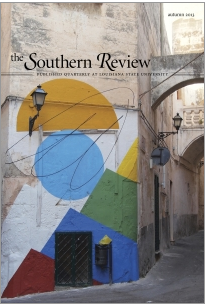 Catchy title, isn’t it? Sounds like something you’d hear on the playground, only this one appeared in a literary playground. And the purveyor of said title (or the flinger of insults, if you prefer to think of it that way) is Barb Johnson, a former New Orleans carpenter who has gained quick notice since enrolling in an MFA program at the University of New Orleans. Recently she was named the fifth recipient of A Room of Her Own Foundation’s $50,000 Gift of Freedom Award. Her piece of nonfiction prose, “John Updike Writes Like a Girl,” appears in the latest issue of The Southern Review (Autumn 2013).
Catchy title, isn’t it? Sounds like something you’d hear on the playground, only this one appeared in a literary playground. And the purveyor of said title (or the flinger of insults, if you prefer to think of it that way) is Barb Johnson, a former New Orleans carpenter who has gained quick notice since enrolling in an MFA program at the University of New Orleans. Recently she was named the fifth recipient of A Room of Her Own Foundation’s $50,000 Gift of Freedom Award. Her piece of nonfiction prose, “John Updike Writes Like a Girl,” appears in the latest issue of The Southern Review (Autumn 2013).
The excerpts below suggest why Glimmer Train named her a Best New Voice:
It’s easy to dog John Updike. Reflexive, even. Anyone who has studied literature—though not necessarily Updike—knows to say that his sentences are either gorgeous and stunning, or, you know, totally overwritten and ostentatious—awash with shimmering phrases, like bubbles that Updike has blown just to watch them catch the light: whee!
In 1962, when he published Pigeon Feathers and Other Stories , Updike was thirty years old. Pigeon Feathers was his sixth book in five years, and his second collection of short stories. He’d already published a book of poetry and two novels. Updike went to Harvard and Oxford and wrote for The New Yorker while still a very young man. Of the nineteen stories here, seventeen of them had been published previously in The New Yorker. Let the haters hate.
Throughout the stories in Pigeon Feathers, the always-male narrator (an easy stand-in for Updike himself) struggles to love the one he’s with (“Walter Briggs,” “Wife-Wooing,” “Should Wizard Hit Mommy?”), to reconcile himself to not being with the one he loves (“The Persistence of Desire,” “Dear Alexandros”), to quell the fear that he is not enough (“Flight”), and to embrace the notion that he sees more deeply than others (“The Crow in the Woods,” “The Blessed Man of Boston, My Grandmother’s Thimble, and Fanning Island”).
I did my best not to think of past criticism when I read Pigeon Feathers. I was determined to read the stories of this thirty-year-old man with a writer’s eye, with a reader’s love of story and language. I wanted to know what that first committee saw in this book.
It has often been said that Updike is maybe a bit too much about style and beauty and not so much about meaning or depth. That’s a fair statement, but what it has to do with the value or enjoyment of his work bears looking into. In one of the two experimental stories at the end of Pigeon Feathers, “Packed Dirt, Churchgoing, A Dying Cat, A Traded Car,” the protagonist, David Kern, says:
There was a time when I wondered why more people did not go to church. Taken purely as a human recreation, what could be more delightful, more unexpected than to enter a venerable and lavishly scaled building kept warm and clean for use one or two hours a week and to sit and stand in unison and sing and recite creeds and petitions that are like paths worn smooth in the raw terrain of our hearts?
This is the value of Pigeon Feathers taken as a whole: I am not particularly moved by it, but it is beautifully done and is, in fact, quite like a path “worn smooth in the raw terrain of our hearts[.]” That is, I recognize it, and recognition resonates whether we like it or not. In this collection, recognition comes mostly in small moments like the one above rather than being embodied in character or drawn out in plot. With a couple of exceptions, all of Updike’s characters are essentially the same man: well educated or about to be, comfortably situated, often working as a writer or about to be. Updike knows his sect. And his sect here is surprisingly feminine—or what is traditionally categorized as feminine—in its concerns. That is, these stories are mostly about feelings and home and relationships.
More than big ideas or lofty spiritual considerations, the thing that links Updike’s protagonists in Pigeon Feathers is an overwhelming fear of death. There are brief, didactic moments in a few of the stories in which the protagonist weighs agnosticism against some Gnostic hitch. The character doesn’t believe in God, for instance, but he’s afraid of dying because maybe there’s no heaven, and then what? But, more than the fear of losing faith or God’s retribution (Updike is quite secular, quite reverent about the sacredness of the ordinary), the darkness that looms…
Here’s a link to order a copy of the review. And from A Room of Her Own Foundation’s website, “Meet Barb Johnson.”

So, the winner of a “Room of Her Own Foundation’s $50,000 Gift of Freedom Award” says someone “Writes Like a Girl,” clearlly intending it as a put-down. Trying to get past the irony of that. Failing.